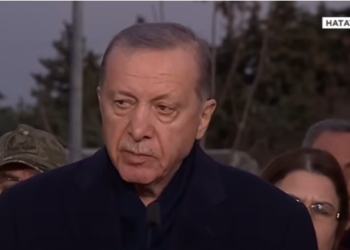The Arab Spring created a diffusion of information and expectations. The international community watched in amazement as revolution spread across the Arab world. But what remains now is confusion about the outcomes of these revolutions, as well as their character.
The term “Arab Spring” has been adopted by academic and political discourse at revolutionary rallies in other parts of the world. There are articles that specifically refer to the Arab Spring in Central Asia or in the Caucasus, as well as articles more recently on “the impact of the Arab Spring on Russia.” This seasonal terminology has developed, too: if a revolution is deemed successful, it brings Spring; if not, Winter. My aim here is not to discuss the achievements or failures of the Arab Awakening, but to illuminate two questions: firstly the character of revolution and secondly, the origins and meaning of the term “Arab Spring.”
However, one year since, it is harder to assess whether spring did indeed come to Egypt, Tunisia, Yemen, Libya, Syria… Among the populations of those countries, there is no single concept or understanding of what exactly has taken place. To many young activists, this is a revolution that will not stop until it has swept away every last remnant of the old system. To some anxious members of the political elite, it represents a protest movement to be met with economic and political reforms. To some segments of the foreign media, it signals a great Islamic Awakening, while to others, it marks the emergence of a secular, democratic generation of politically engaged citizens.
While the Arab Awakening has led to a post-dictator period in some countries, other problems remain unchanged. Before, critics of the governments in many Arab countries condemned the West for, as they saw it, helping to protect the interests of the incumbent regimes. In the past, these broadly anti-Western groups, regardless of whether they are Islamist or nationalist in their thinking, have issued unclear statements on whether they will support democratic liberties if they come to power. Similarly, in the past, the real or imagined “fundamentalist” character of some Arab opposition movements was used by regimes to justify the refusal to organize elections; the ruling elites used “fear of fundamentalism” to falsify elections. Now, looking to the post-Mubarak elections in Egypt, we find the same fear of Western countries, the emergence of political Islam and even the beginnings of fundamentalism.
According to Solon’s ancient aphorism, we must strive to understand and judge a life “before it is finished.” If we apply this aphorism to politics with the aim of trying to understand and judge a revolution “after it is finished,” we can see both achievements and failures. The key achievement of the Arab Spring is the hailing of the “post-dictatorship” period; it remains questionable whether these countries are on the path to becoming properly functioning democracies. One year since, we know that people revolted against autocratic regimes. But we don’t know how the power vacuum will be filled; the alternative to autocracy was not clear at the time and remains unresolved. In this sense, anarchy across the Middle East is preventing us from seeing “a history of the future,” only “normalization of history,” which is summed up in the post-revolution period in MENA. Thus, the central part of this revolution is its “anti-autocratic” character.
Secondly, the Arab Awakening is often called a “leaderless revolution.” In contrast to the revolutions in Eastern Europe and the Soviet Union during the late 1980s, we don’t see the role of the intellectual part of society. Many analysts link the diffuse, somewhat leaderless nature of the Middle Eastern uprisings to the prominent role played by social-media-enabled peer-to-peer networks. I remain on the fence concerning this matter, however, I will argue that it is wrong to assume that open networks naturally facilitate “leaderless or horizontal structures.” Let me say that many late-20th century uprisings that predate the Internet have happened without strong leadership, and that “leaderless revolutions” are not a new phenomenon. Discussion of the Arab revolutions often underestimates the contribution of satellite television, in particular the pioneering Al-Jazeera, to the emergence of independent Arab public opinion. That’s why the post-revolution period in these countries has not seen a reversal of the Matthew effect, the sociological phenomenon whereby the rich get richer and the poor get poorer. There is an urgent need for a leader who can put forth a vision for economic equality and the rule of law, the initial requirements for a democratic state.
Identifying the origins of the term Arab Spring provides some useful insights. In the July 2005 edition of Le Monde diplomatique, in an article entitled “Arab spring: late and cold,” the author uses “spring” to describe the process of democratization. Historically, its usage dates back to the European Revolutions of 1848, known in some countries as the Spring of Nations, the first Europe-wide collapse of traditional authority. More recently, we had the Prague Spring, a period of reforms under the guise of the “normalization” of political and economic life during the late 1960s. Thus, it might be better to refer to current events as “the Arab World’s Spring” or the “Arab Revolt”; if Spring means political democratization across the Middle East, it should come once political stability has been established.
Notwithstanding these nuances, Turkey is playing an increasingly important role, which is welcomed by most Arab countries. Thus the “normalization of history” in the Middle East refers to the historical background of the Pax Ottomana (the Ottoman Peace), under which the Ottomans delivered peace and political stability to the Balkans and the Middle East over the centuries.
Finally, in the past, revolutions have generally been described by the name of the month in which they started. But now, we are speaking of seasonal — and therefore cyclical — revolutions. What implications do these nuances hold? Beyond debates about the name of the revolution and whether the term can be applied to other countries, what is required now is an exit strategy from the current fragile and insecure situation in Middle East. Only then we can talk about an Arab Spring.


















